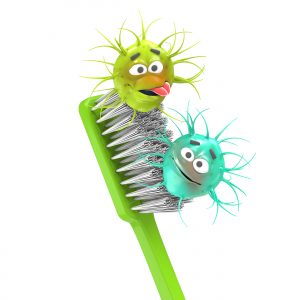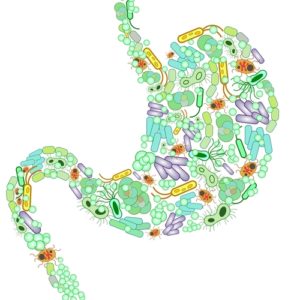I chew chew chewse you
We’re taking a magical mystery tour down the digestive tract this month Dames.
Why? Because a good poo every day is a good day (just ask someone who doesn’t…) and it’s something that has a tendency to change as life takes us on her merry march.
Let’s start then, at the very beginning (that’s a very good place to start).
The mouth.
Digestion begins the moment you look at food. Signals are sent to the brain to start the production of saliva and stomach acids in readiness for the goodies coming your way.
Our mouths contain more nerve endings than almost anywhere else in the human body, that’s why mouth ulcers hurt so much and a tiny chia seed stuck in your teeth feels like a giant boulder.
In 2006, scientists discovered a painkiller in saliva stronger than morphine (it’s called opiorphin). Luckily, we only produce small amounts of this substance, otherwise I guess we’d all be ‘spaced out on spit’ most of the time. Interestingly though, it has been postulated that one of the reasons some of us might comfort eat is to produce more opiorphin (which may also have anti-depressant effects). So maybe we are getting high after all…
Did you know? Saliva is made up of filtered blood and we produce about 700mL to one litre of saliva every single day.
Most of the bacteria in our mouths are beneficial, forming biofilms (a thin layer that sticks to a surface) to keep out the ‘baddies’. It’s also now thought that the bugs in our mouth might help to regulate our blood pressure by producing nitric oxide, which helps to relax our arteries.
Want to get more nitric oxide in your diet? Eat beetroot. There is a strong link with periodontal (gum) disease and cardiovascular disease – maybe this is the link?
Party time
When we go to sleep at night we produce very little saliva and that’s why we end up with that delightful morning breath (night time means party time for your microbes). If you have bad breath outside of these times it may mean you are producing more non-beneficial bugs (an overgrowth of Helicobacter pylori – the bug that causes stomach ulcers – can sometimes be a culprit) or you’re not flossing and brushing your teeth very well.
Menopause can cause dry mouth which may increase your risk for gum disease and cavities. When your salivary glands fail to produce enough saliva to wash away oral bacteria, germs can accumulate inside your mouth, raising your risk for gingivitis and tooth decay.
This may help:
Fresh breath remedy
- 500mL of boiling water
- 30gms dried Rosemary.
- Cover and steep for 30 minutes.
- Strain and gargle several times per day.

Chew your food
A note on chewing; I went to boarding school and every night the headmistress would dine with us (very Dickensian). We didn’t much enjoy this, especially if you were seated at her table for the ENTIRE term. We would all scoff our food down very quickly, only to be left waiting for Miss Barr to finish her dinner. She insisted on chewing every mouthful 26 times, which to a precocious teen was an eternity. Turns out, she was onto something. Chewing your food thoroughly, affords many benefits such as:
- Maintaining a healthy weight
- Absorbing more nutrients
- Easier digestion
- Better for your teeth
- Less non-beneficial bacteria in your intestines
It's 'alimentary' my dear Watson
 Next stop…down the throat and into the stomach.
Next stop…down the throat and into the stomach.
After chewing our food into small pieces it takes its leave from our mouth and heads off down the oesophagus.
The oesophagus looks a little like an old fashioned telephone cable (for those of you who can remember before mobiles) and is around 25cm long.
Every day you swallow between 600-2000 times and to be able to do this it requires the work of no less than 20 pairs of muscles.
Your oesophagus hits your stomach on the right side, which is not the shortest route it could take, but is where the least pressure is exerted when you walk or cough (otherwise we would be burping or vomiting with every step!).
Once food hits your stomach it finds a highly acidic and mostly sterile environment (not too many bugs hanging out here, except… good ol’ Helicobacter pylori). The stomach acid helps to:
- Activate digestive enzymes
- Kill bugs
- Denature large protein molecules
Did you know? That H. pylori has lived with us for so long that scientists can tell which human populations are closely related by looking at the particular strains of H. pylori they carry.
The stomach is responsible for the initial breakdown of protein, carbohydrates and fats (our macro-nutrients). It also produces hormones and chemicals for optimal digestion. The major role it takes is breaking down food into tiny, tiny pieces (about 0.2cm big) for delivery to the small intestine.
Depending on what you’ve eaten will depend upon how long food hangs out in the stomach. Carbohydrates move more quickly through than fats and proteins. A piece of cake, for example, will be churned up in about two hours, whilst your lovely, juicy steak, may take up to 6 hours before it continues on its way. That’s why a carb rich meal doesn’t leave us feeling as full for as long.
Reflux
Sometimes the stomach sends gastric juices where they shouldn’t be, back up into the oesophagus. This is known as reflux. The standard treatment is to give antacids, which is problematic in the long-term, as it reduces stomach acid and can lead to an overgrowth of non-beneficial bacteria (namely, H pylori – not that old chestnut).
Plus, as we age, we make less hydrochloric acid (HCl) in our stomachs, which means we can be more prone to reflux. I certainly know when I’ve had a good Indian meal I’ll be eating it for many hours after… (the pleasure is worth the pain though!).
The mineral zinc helps in the production of HCl – be mindful of how much you take though. I often see Dames in the clinic who are self-prescribing and end up taking way too much of it.
Suffering from reflux? Try this:
- Apple cider vinegar – add to meal 2-3 teaspoons in a small amount of water, consume with meals (Braggs or Melrose – from health food store or the clinic).
- Include ginger and turmeric in the diet – these are great anti-inflammatories.
- Eat the protein portion of the meal first.
Loving your guts
If you’ve been feeling more Bloaty McBloatface than usual:
- Keep a diet diary for a week – notice any trends? Email me for a fillable diet diary so you can track all that goes in and out and through.
- Try cutting out gluten for a week and see if that makes a difference – you’d be surprised how many people report back that this simple tip makes a significant difference.
- Consider doing a 4-6 week Gut Reset. I’ve been running this successful programme in my clinic for over a decade and now that the weather is getting warmer, it’s the perfect time for a ‘tidy up’. Get in touch to find out more.
- Manage your stress – you have as much of the feel good neurotransmitter, serotonin, in your gut as in your brain.
- Download the Insiders’ Guide – Bloaty McBloatface. It’s filled with practical magic and actionable steps for you to help ban the bloat for good (and comes with a consult with me to help get you started).
Next time we’re talking all things poo. You don’t want to miss that chat…
Until then, you know what to do. Keep being Great.
Marnie
P.S If you haven’t already done so, make sure you download your FREE Survivor’s Guide to Menopause (did I say it’s free?).
P.P.S If you know someone who is struggling with all the changes, please share this with them.
